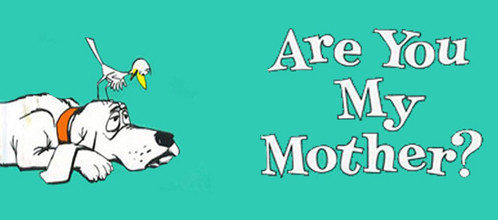Are You My Mother?

I am a fraud. I have purposefully lied to my five-year old on numerous occasions, and have upheld those lies in a complex web of deceit bordering on conspiracy. I lie to her daily, in fact. Naturally I employ the usual falsehoods necessitated by modern single parenthood in order to manipulate and control the youth—we can’t go to the toy store (in the middle of the day) because it’s closed…if you don’t come here right now I’m leaving without you…if you lie to me your nose will get longer. I have further upheld cultural norms and misled her into believing in the existence of a jolly bearded man who lives at the North Pole and whose life mission is to fly around the earth once annually delivering gifts to all the children of the world. I have occasionally been caught in these lies, such as when I told her how lucky she was to receive said holiday presents, mistakenly letting it slip that some children in poverty are not so fortunate. “Why won’t Santa visit poor kids?” she asked innocently. I thought carefully about my response, realizing the entire fabrication was at stake should I reveal information contradictory to the contrived paradigm. “Um, nevermind,” I said uncomfortably. “Look, shiny things.” I’m used to constructing paradigms, whether it’s a popular one about an elf or a completely unnecessary one in which America has more princesses than the entirety of Europe, all of whom happen to reside in Orlando. But there’s one in particular I have scaffolded, that most parents never will.
Like most parents, I stay awake some nights worrying about the child I’m raising. Like most parents I worry about making ends meet and whether I’m making the right decisions. I worry about her welfare and my sanity. But unlike most parents, the child I’m raising is not my own. I did not give birth to her. I have not legally adopted her. She is a five-year-old ward of the state. It’s hard for me to look into her beautiful baby blue eyes and see her as a statistic, but she is. So am I for that matter. And the biggest paradigm I’ve ever created involves the nature of our relationship with one another. It is a relationship in which she calls me mommy and assumes she came out of my tummy. It is a relationship in which she thinks her father, whom she’s never really met, and I were involved romantically at some point in order to conceive her. But that’s further from reality than a Justin Beiber ad campaign.
The chances were always pretty slim that I’d be conceiving a child, much less in the traditional way. I’m gay and only ever flirted with the idea of going all Kirstie Alley in Look Who’s Talking—you know, the movie that revived John Travolta’s career long before Pulp Fiction, in which Kirstie Alley’s character is artificially inseminated through a sperm bank. Oh wait, she wasn’t inseminated, she just told everyone she was. Well, whatever, I didn’t really flirt with that idea anyway, so much as I kind of shyly glanced sideways at it once. I was young and only five feet tall, and would have looked an awful lot like a pregnant choir boy. I decided I didn’t want to spend time explaining to confused people that I had a vagina.
When I was 33 years old, my then seventeen-month old niece from Kentucky came to live with me, and instead of becoming Kirstie Alley I became Diane Keaton from Baby Boom, except without Sam Elliott and a million dollar baby food idea. Caroline and I experienced our first paradigm shift with one another—in her case, it mainly involved a different crib, and in mine it began a 17-year countdown to freedom. After the first week Caroline spent in nursery school, the lady who cared for her asked permission to refer to me as her mommy. All the other kids had mommies. It was a natural thing for Caroline—then learning to speak—to want to say mommy. I hadn’t thought about what I might be called. “Sure,” I said, “I guess.” Even though I hadn’t considered it, naturally it would be comforting for her to be like everyone else. There is contentment in sameness. Not like Borg sameness, that’s just creepy. But fitting in does feel good. It was weird to hear myself called mommy, at first, but now I can’t imagine Caroline calling me anything else. Well, she calls me that and sometimes poophead. I’m used to both.
On February 24th, Caroline will have lived with me for four years. I have done most of it on my own, with occasional help from friends. I have no co-parent. There are no grandparents close by. I have sculpted my life around caring for her. I learned to change diapers and install car seats and how to rock a baby to sleep. I traded a social life revolving around a bar to one revolving around playdates. I bought a house based solely on the school district it was in. I even got a cat when Caroline was two, so we could have a family pet. She named him Gus after the mouse in Cinderella. These last four years I’ve learned a lot about myself. I learned how long I can hear the Barney theme song before I snap, how long I can go without a shower before I snap, how many times my head can be bounced on at six o’clock in the morning before I snap. Basically I learned my snapping thresholds. But I have also learned how much it’s possible to love another person, that it’s possible to be so full of love that it hurts, and that I would give my life without question to protect hers.
You know how they say no one can know for sure if the purple you see is the same as the purple anyone else sees? That it’s entirely subjective and therefore impossible to measure. When Caroline was three and I’d ask her a question she didn’t know the answer to, she would always respond with, “I can’t know” instead of “I don’t know.” Besides being cute as hell, it always struck me as strangely profound, that there are some things in life—like an individual’s interpretation of the color purple or who will win the world series next year or what they’re saying on Honey Boo Boo when there aren’t any subtitles—that can’t be known. I used to wonder occasionally if I feel the same way toward Caroline that any other mother feels toward a biological child. I don’t wonder anymore, because comparison is the thief of joy, and also because I have decided that my purple is the same as anyone else’s purple. Maybe it’s even purplier. I love her beyond words.
It is my love for her that has prompted me to construct and maintain the elaborate paradigm I find myself in. For all intents and purposes, I am her mother. I bathe her and feed her and tuck her in and hold her when she cries. But this paradigm, like most childhood paradigms, will have to shift at some future point. There will be a day when she asks about being in my tummy that I will no longer be able to respond by pointing to some stickers. I’m not sure why I don’t do it now other than my own desire to take the least resisted path, like a drop of water running down a stone. There’s plenty of time, I say. Wait till she has a more sophisticated and nuanced understanding of the world, I say. There is a desire, a selfish one on my part, to maintain a bubble of innocence for as long as possible. But there will be a day when I will have to sit her down and look into her baby blue eyes and explain to her that I’m the same person I’ve always been, and that labels won’t change that. That we love each other and everything else is just minor details. It will be the day I come out to her. I have some experience with coming out, and if it’s anything like my first time, I know I’ll cry. As for her response—well I guess that’s something I can’t know. Hopefully she doesn’t think I’m a fraud. Maybe she’ll just start calling me poophead with more regularity, instead of mom. I’m used to both.

Amy3
February 6, 2015 at 10:05 pm